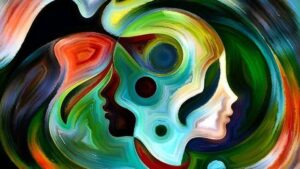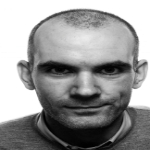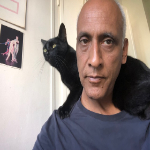TRANSLATED FROM THE ITALIAN BY MARTIN DE SA’ PINTO
“YOU ARE WITH US, YOU ARE LIKE US, WE WILL DO EVERYTHING TO KEEP THIS GROUP INTACT, OUR FRIENDSHIP, OUR LIFE. WE SEE YOU, WE RECOGNIZE YOU. YOU SEE US, YOU RECOGNIZE US. WE CHASE AWAY LONELINESS AND WE ARE GOOD TOGETHER. WE CLOSE RANKS, WE PULL HARDER FOR EACH OTHER, TO HOLD EACH OTHER UP, BEFORE WE LET GO ALTOGETHER AND THE GROUP BREAKS ASUNDER.”
This morning, for no particular reason, I started thinking about a dear friend who unfortunately, for a while now, has been having some problems; he’s not well, and we hardly recognize him.
Among friends we say that George – let’s call him George – is ill, he’s a little crazy, he’s not doing well. He’s acting strange. And we understand each other, we nod our heads, we feel a little sad for a moment, and then we move on.
Particularly in the early days of his illness, when the rest of us noticed that things were not going well, he seemed to think he was talking on the phone, arguing with somebody, but in fact he wasn’t talking to anybody; he didn’t even have a phone in his hand.
Before long, a curtain of silence descended over this friend. Gradually but relentlessly he was excluded from our conversations until at last, no one wanted to visit him or invite him to join us when we meet up. It is not that we do not want him in any real sense; it is more like a silent exclusion from our circle of friends, no arguments, no apparent reason. He is there, but not really there. He is still George, but he is no longer the same person and we no longer recognize him.
Finally, it happens. We gradually stop thinking about George, and when we do, it’s in another way, and if we meet him by chance, we treat him differently. We are careful how we speak to George, wary of the words we use. Our discussions and words lack truth or feelings. This is the final step towards isolation as we distance him from ourselves. Until we can’t even lie anymore. And then the presence of his illness, looming in the background, starts to undermine our group of friends and our view of life and the world. He does things, he says things that should not be said and should not be done. We do not know who decides what should be done or said, but we do know that what George does shouldn’t be allowed. And the same goes for our group of friends.
It also seems to me that George has become increasingly bizarre over time, and is starting to identify himself in his eccentricities. If before these were unexpected and abrupt moments which passed quickly, now it’s as if in order to be recognized, to be seen, he needs to express even more forcefully that behavior which we judge to be abnormal, inappropriate, for us and for others. It is as if he’s saying to us, look at my illness, it’s here, and it’s hitting me harder, pushing me to jump higher in the silent crowd to get noticed, be seen; in the midst of this greyness, I exist, I still exist. Look at me now, please. I said now, not before; not as I was, but as I am. And why does he want us to look at him, we ask ourselves, why does he insist, it’s not possible, it’s unbearable, why does he carry on when our first reaction is to turn our heads away in tacit agreement that this kind of silence is more comfortable for us all?
The silence around George continues. Nothing changes. In fact, the more he pushes, the more silent we become, wrapping ourselves up in our overcoats to protect ourselves from this cold. But in our heads, at least for those of us incapable of erecting solid walls of indifference and self-protection, those who remember the springtime, something else is going on.
We have this nagging worry that if he has succumbed to this illness, he, to whom we were so close, there’s a chance we might also get sick, that this illness is something still there among us, that it has entered into us as well. Although someone in the group tries to reduce the issue to “George has always had problems, he’s always been weird, he comes from a weird family, it’s genetic, he made choices that made him what he is now, he’s unlucky, George is George, you know how it is, right?”, we feel that if someone so close to us can get so ill, can start saying and doing things like that, we might be affected as well.
The feeling of possible contagion, of the chance that the world as we have experienced it so far is not what we expected it to be, sets in and we harden our hearts. We categorically refuse. We resort to rationality, our arms hang limp, dripping with it. We break down the facts. We analyze all the data we can remember, all the affirmations that we possess. We must know what we know. There is no room for doubt. The slightest doubt could be fatal. We discuss this with our psychologist, who reassures us that although we are George’s friends, we are not George, we are different. George is George. And that’s all.
We breathe a sigh of relief, and everything seems to be back to normal. Until the day when, because we live in a small town, we run into George again. In spite of himself, and in spite of the fact that we, his former friends, now ignore him, he stubbornly shows up around town, passing by places where he might meet us. Not even the good grace to go and hide somewhere where none of us can see him, not even an ounce of dignity, showing up in this state. We use the strategies recommended by our psychologist to cope with these constant appearances of George pretending to talk on his imaginary phone and doing what people like him do. Damn George.
But the doubt does not leave us, and finally, we cannot help but think that if he fell prey to this disease while living within the same system of relationships and life as us, it is possible that within our system of life and our network of relationships such diseases can arise. It is possible that this network of relationships, our life and our world are not what we thought they were.
But let us try to focus on the facts: most of our other friends are well, and so far our relationships have been good for us, have allowed us to lead our lives happily, at least we think so, and to maintain our friendships. Our sick friend, George, undermines our world and our feelings of security among people who recognize each other and are reassured by this recognition and acceptance: you are with us, you are like us, we will do everything to keep this group intact, our friendship, our life. We see you, we recognize you. You see us, you recognize us. We chase away loneliness and we are good together. We close ranks, we pull harder for each other, to hold each other up, before we let go altogether and the group breaks asunder.
Once silence has settled on one matter, then it devours everything else, someone once told me. Our group becomes a constellation of groups. More silences and formality and how is the family?
Between one group and another I begin to wonder: What if it were me? How would I feel if my life and my illness were reduced to this sudden isolation, a quick nod of the head tossed from afar as a former friend continues on his way? If I were conscious of it, would I prefer silence, like that with which we suffocate George, or would I want to talk about myself and my illness all the time? Wouldn’t all this talking be strange? Why should or would my friends always want to talk about my illness? What would prompt my friends to talk about it all the time and spread the word to other friends and people I don’t even know? What would they get from doing it? Why should my illness become a topic of public discussion? One of them would, maybe, advise me to go see her psychologist, who is a good person, smart, and who has worked miracles with her husband Francis, who is now back to normal, back to the way he used to be. I take Francis’s psychologist’s card and don’t go there. I think it is a lie that someone can get back to what they were before, I think her psychologist may be fine reassuring my friend about Francis’s health, but not about curing Francis himself – assuming he wants to be cured, even if someone can cure him.
Then I begin for real to act like George, the sick friend. I follow the same route, I see my friends’ visits shrinking by a lot, discussions always circle around the problem, the silences are the platitudes that make me lose the will to see these friends.
So, I start making new friends of people who I didn’t know before and whom I would have previously called weird. I even seek them out – because I don’t want to be judged, because I have this feeling of danger lying within the soul of my friends and I keep well away. Like George, sure, sometimes I run into them on the street or we find ourselves in the same places. But by now we have all become professionals at saying nothing, pretending, each going his own way. Conversely, when my new friends, strange and unknown, tell me that I am right and that yes, what I hold in my empty hand is really my phone even though no one can see it, I believe it. Now you are with us, you are like us, you are the one who is right: you are not alone, you are no longer alone. I develop and refine the quirks of my behaviour, I let go, “He has let himself go”. I became George.
Between me and my former friends, a feeling of estrangement dominates the scene. We no longer recognize each other. We have nothing to share. We are strangers. As if we have always come from different worlds, but have only just realized it, the truth has broken free. No one protects anyone, no one looks at anyone.
We have taken on our respective mantles: I am the sick one, my friends are the good ones, the ones who have imposed silence, the ones who know what to do, who I should listen to, even though in my soul I feel that everything is falling apart and that this world is no longer compatible with my life, this world that does not believe that I think I have a phone in my hand, even though there is nothing there, that does not believe in my long discussions on my imaginary phone. This world that doesn’t understand that once I start accepting something like this, accepting that I believe something, everything else will follow. And I will never be the same again.
My recognizing myself becomes not recognizing myself with my friends anymore. I build my conversations on the strangeness I feel towards them and the support I get from my new friends, all strange and unfamiliar, like I am now according to my old friends; but we are all like me, as if we were all strangers.
The compass is set. It is difficult to go back. Time passes, our lives continue in one way or another. After the first flare-up, things calm down, new relationships take on their solidity and become stable and continuous. A new paradigm and a new group are created – even exclusion makes groups, even a single person makes a group. George was the first to make a group. Now it is all the rest of us.
After years, if we are not dead, we pass each other on the street, some of those friends from before, we nod to each other, we finally understand each other because we know what happened, but we keep our distance. With some of them there is not even a greeting. We are lost, still frozen in the same position. We no longer even remember who that person is who greets us from across the street. We don’t even know if we know her. Nor do we even care anymore. Too much time has passed.
I wonder, then, after this projection into a possible future, how to reconnect with George who is not well. How to block out the silent voices. If it is true that George could be me, then I must begin to think of his illness as an opportunity to understand myself. I begin consciously to internalize it and try to understand. It requires a whole spiritual exercise that can take a long time, to maintain my identity and spirit and at the same time make room for the sick friend. I begin to doubt other friends’ words about him, I reject both the silence that ignores and eliminates him and the silence that excludes his illness from our conversation. I begin to reject those who talk about it dismissively with others.
Then I began to go looking for him. I talk about everything except his phone, which he thinks he has in his hand and with which he gets lost in very long conversations. I always wait until he finishes the imaginary calls to continue talking to him. If, when I am about to leave, he tells me he will call me with his phone, I tell him that it is fine with me, but he could use the other phone, the one that works better. In any case it is not the phone that is the problem. It is not his imaginary phone that has kept him apart from me, as well as all the other friends in that group that is now so many groups.
The problem is us, and we need to do something, to find a new way to talk to each other, without deferring to others, without waiting for someone to come along and sort things out, to tell us that now is the right time.
The problem is us who do not have the courage to take the floor, to call that person who undermines our certainties, who creates fissures in our lives, our normality, made up of not wanting to know and not wanting to say and not wanting to call George. With one or the other of our phones. And the hardest part in all of this is not being scared.
Also, read The Neighborhood Phone by Gabriella Ghermandi, Translated from The Italian by Giovanna Bellesia- Contuzzi & Victoria Offredi Poletto, and published in The Antonym:
Follow The Antonym’s Facebook page and Instagram account for more content and exciting updates.




























0 Comments